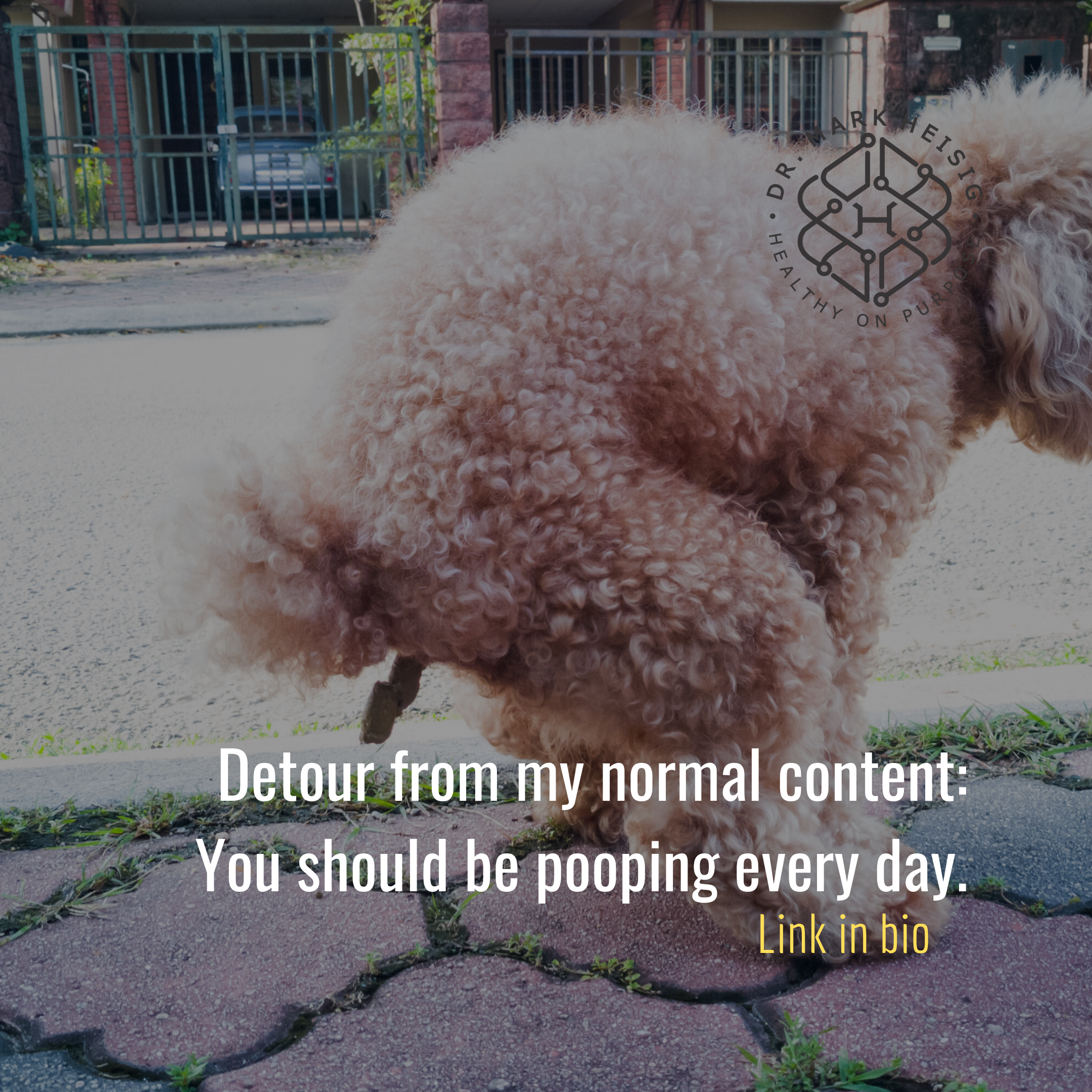How often should you poop?
Things you shouldn’t consider normal: About your poop
Pooping less than 1 time per day… is not healthy.
Don’t worry about the “link in bio.” You’re reading the link.
I know you’ve probably heard that “normal” and “healthy” is merely pooping when you have to, and that’s cool. The American Journal of Gastroenterology has NHANES (United States population survey) data that says “3 BMs per day” to “3 BMs per week” is normal in the US population. Keep in mind, the CDC notes that 60% of the US adult population live with a chronic disease and 40% live with two or more chronic diseases.
So, yeah, 3 BM’s per week might be normal in the US, but so is chronic disease. Just because this data is “normal” American crap, does not mean that this data represents “healthy” American crap.
Let’s think about our poop a bit deeper…
If you only “have to” poop every other day, or even less, then you probably need to change something about your current health or fitness situation.
There are some clinical implications and basic physiology that suggest strongly that pooping at least 1 time per day is not only reasonable, but expected, and healthy.
Why is it expected?
It is expected that you poop once per day because you likely eat at least once per day.
Why does that make sense?
Let’s follow a bite of an apple from your mouth to the toilet.
You chew the apple in your mouth and swallow it down your esophagus where it lands in your stomach. Your stomach blasts it with acid and some enzymes and slowly lets it pour out into the small intestines, for lots of nutrient absorption. It flows from the duodenum (1.5ft) to the jejunum (7-10ft) and then the ileum (10-13ft) merely to make it through the “small intestine.” From the small intestine, it goes to your large intestine (5-7ft) where we grab some extra water and nutrients (this is also where our happy bacteria hang out). From the large intestine the apple, more like poop, makes its way to your rectum and out your anus.
This whole process takes about 1-4hrs for the stomach, 4-8hrs for the small intestine, and 12-25hrs for the large intestine.
If you do the math, it equates to roughly 17-37hr for food to go from mouth to toilet.
“See! It could take almost 2 days for food to get to the toilet, so I don’t have to poop every day!”
Yes, my eager, heckler. However, if you eat at least once per day for… I don’t know… years, then you should also poop at least once per day.
For most food-secure individuals, that conveyer belt is locked and loaded with food at least every 4-6hrs, if not more with snack-grazing. And it didn’t start yesterday, it began as feeding infants.
Clinically we see that not pooping enough (<1-3 times per day) is associated with a 3 to 4-fold increase in the risk of Parkinson’s Disease in men. Other data show that women are not off the hook either.
So what is normal?
This is where we get into the nuance that is medicine… and probably won’t discuss this much further here as your situation may or may not need some physician swag added to the plan.
Normal is “not constipation” and “not diarrhea.” And to make that more complicated, we often see people clinically who report constipation… while pooping once per day.
So what do we make of this? Think kind of like Goldilocks.
You should poop regularly, at least once per day. Your poop should be easy to pass, not little rocks, not cafeteria chili, not undigested, not floating every time, and never any blood. Too much is not great. Too little is not great either.
It’s that simple… and complicated.
How can you try to “Goldilocks” your poop?
Achieving this fecal perfection can actually be pretty simple if you cover the basics. (They're called "the foundations of health" for a reason.)
Drink water. Aim for 64oz, more if you exercise or live in a hot, dry environment. You'd be shocked at how just increasing your WATER intake can help your bowels.
Exercise regularly. Move, breathe, sweat, play! It will help your intestines move, as well.
Eat plenty of fiber: Fruits, vegetables, and whole grains. Another painfully simple, and shockingly powerful intervention. You should be looking to eat around 25-30g per day.
Find a healthy stress release. Being stressed out can slow you down. Breathe, journal, sing, relax with friends and family, and do things that rejuvenate you. (Note: Alcohol doesn't count.)
Don’t rely on laxatives long-term. They’re a band-aid, and some types may actually create a dependence.
No jokes, consider a Squatty Potty. There is a muscle called “puborectalis” that can impede a healthy evacuation of your bowels. Getting your knees up with a stool (no pun intended) or a Squatty Potty can relax that muscle and help you have a healthier, easier BM.
Consider these basic tips to get your bowels regular! And if you’ve given these all a fair shot and would like to get your bowels regular, let’s chat! Gut health greatly impacts your brain health!
Dr. Mark Heisig is a licensed naturopathic doctor with continuing mTBI education from The American Academy of Neurology (AAN), Complete Concussion. Management (CCMI) and The Carrick Institute. His office is located in Scottsdale, AZ.


